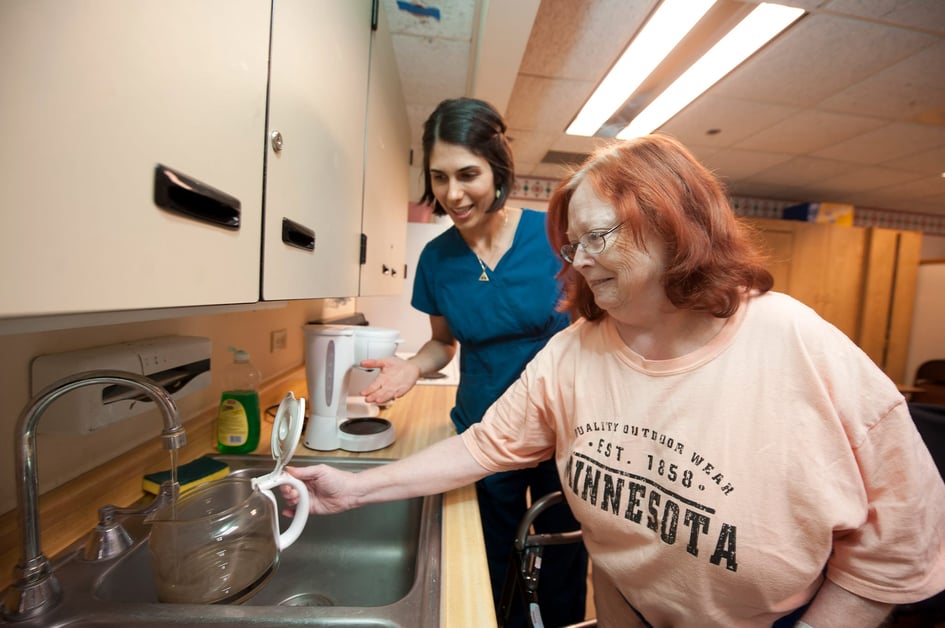Understanding transitional care: What to expect after a hospital stay
Walker Methodist | Jan 12, 2022

Transitioning home from the hospital, no matter how long the stay, can often feel overwhelming and sudden. You or your loved one may need further assistance in the recovery process, like getting up and around again or taking care of wounds.
When it’s time to leave the hospital but not quite time to go home, we recommend transitional care.
It’s hard to know what to expect upon being discharged from the hospital and into a new home, but we can subside the uneasiness by discussing exactly what your time in our transitional care unit will look like.
Discharge planning
As your hospital discharge approaches, transitional care should be recommended for you or your loved one ahead of time.
Discharge planning is an essential part of preparing for your hospital departure, whether you’ve had in-hospital care for a pre-planned surgery or have had an event that required sudden hospital admission.
The planning process will include evaluating you or your loved one’s medical condition, discussing it in-depth, and deciding where you will go once you leave. If transitional care has been recommended for you, your doctor will issue a referral and help ease you into your transfer.
The caregiver’s role
As a caregiver for your loved one, it’s important to serve as an advocate and support during the recovery process. The medical team will be the ones lining up care, but it is your job to ensure that you provide the recuperation support your loved one needs.
For those recovering, this is an important time to voice your opinions and concerns as you transition into a new, temporary home.
We are here to help ease this transition and provide any support we can for the whole family. We don’t want you to do this alone.
During transitional care
Although each of our locations is unique in its transitional care services, they are all designed specifically for the comfort of our patients.
Our care is administered with the intent and hope that patients should be able to return home as soon as they can. In the meantime, however, we provide a long list of amenities to make time spent in transitional care feel like a “home away from home.”
The type of care you or your loved one will receive will depend on the healing that’s needed. We provide a knowledgeable and friendly team of therapists that can help you determine the best next steps.
A few of our services include the following:
Occupational therapy
We help restore, maintain, and develop your loved one’s ability to complete daily life tasks. We know being able to independently complete everyday activities in the home, workplace, and community are vital to recovery.
Cognitive rehabilitation therapy
Recovering from a brain injury can be difficult for the whole family. We help individuals relearn and improve in areas such as thinking, learning, memory loss, planning, and decision making.
Physical therapy
Our skilled professionals aid our guests by encouraging improvement in their physical movements, sensations, strength, and balance through tailored exercises, and activities.
Rehabilitative/assistive technology
We have the ability to implement tools, products, and equipment that help people with disabilities move and function. This includes orthotics, wheelchairs, prosthetics, walkers, hearing aids, and more.
Recreational therapy
We provide games, arts and crafts, animal support, and relaxation therapy to cope with anxiety and improve social and emotional well-being.
Speech therapy
For individuals struggling with movements of the mouth and tongue, we offer therapy aimed at improving swallowing, speaking, pronunciation, and language.
Music and art therapy
We believe that music and art therapy can aid in helping individuals improve cognitive development, express their emotions, and connect to others socially.
Transitioning home
.jpg?width=450&name=20120127_wm_412%20(2).jpg) Our goal from the start of transitional care is to get residents home where they belong.
Our goal from the start of transitional care is to get residents home where they belong.
As we begin to plan for transitional care discharge, we work with each resident’s caregivers or family to ensure that they have a safe environment lined up to continue healing.
We assign professionals to each of our residents who help with support during the transition process. You or your loved one may be sent home with a printout of exercises to do on a daily or weekly basis to help support rehabilitation. In some cases, you or your loved one may even return to our facilities on a scheduled basis to participate in therapy as needed.
We know that the transition back into a home environment can be difficult, and assisted living may be a better option. Whatever the decision, we are here to support you every step of the way.
Transitional care bridges the gap and offers support when it’s needed most.
Transitioning from the hospital and back into everyday life can be more difficult than expected. As you or your loved one continue to heal, we strive to create a space fueled by love and support.
At Walker Methodist, we cultivate an environment of kindness and comfort for those who need it most.
Contact us today to learn more and discuss what transitional care might look like for you or your loved one.

